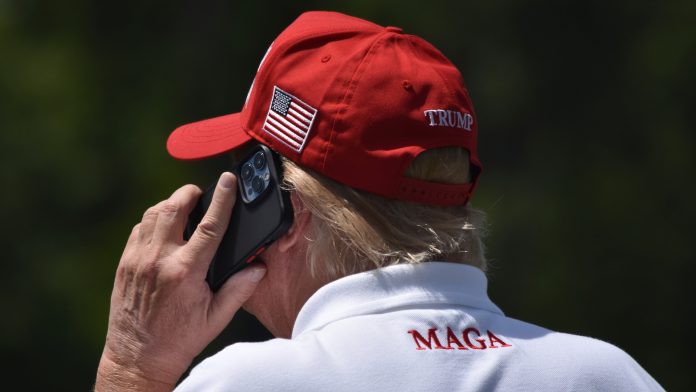That was a crazy public service provided by Elon Musk and X.
The X Spaces interview delivered Donald Trump without makeup or dress-up, talking unselfconsciously: manic, boastful, untruthful, aggrieved, abusive, obsessive, random, ignorant, tedious, bitchy—and ultimately, formless and endless. You might think a major-party presidential nominee would have other claims on his time, some sort of deadline, if only to get some sleep to ready himself for the next day’s campaigning. But no. At no point in the explosion of talk could one guess whether it would continue for another five minutes or another five hours.
Presidential campaigns typically struggle against the limits of time, especially as they enter the final autumn stretch. There are only so many days, so many hours, to reach so many millions of people across this vast country. The candidate’s minutes are a limited and precious resource, to be allocated by art and science to best effect. Yet Trump seemed to have no budget for his time, no plan of campaign, no message to drive—and nothing else to do, nowhere else to go.
Trump’s not running against President Joe Biden anymore, yet he talked about Biden at least as much as about his actual opponent, Vice President Kamala Harris. He still lacked any clear or memorable critique of her, except for his derisive comments about her supposed inability to do the kind of interview that he, Trump, was making such a desperate hash of. Trump is the challenger and the topic should be the Biden-Harris record, but he preferred to reminisce about his own good old days.
[Read: Elon Musk throws a Trump rally]
There’s an old joke about the fool at the poker table: If you don’t know who it is, it’s you.
Musk had a rational plan for last night’s event. An interview with a major-party presidential candidate drives traffic. A fawning and flattering interview might well buy favor for Musk from a possible future Trump administration. Sure enough, Trump offered Musk a position on a hypothetical commission to purge waste from government spending. Musk enthusiastically accepted.
The interview also cast light on the discipline and strategy that has guided the reintroduction of Harris to the voting public. Harris ran for president in 2019–20 without igniting much enthusiasm. As vice president, she made little impact on governance. She campaigned hard in the 2022 midterms. Yet the groups she was supposed to excite—young people, Black Americans, women, and white female college graduates—posted generally lower turnout rates after her 2022 appeals than they did in the midterms of 2018. Before this summer, she was not widely regarded as a political star.
Then suddenly: Zing! The lights all went on. Huge crowds have gathered for her, sizzling with enthusiasm. How did that happen? Through the alchemy of politics, an alchemy that invites people to see themselves in a political champion, that depends heavily on selective availability. A champion who’s too invisible fades from mind, as Biden did during his presidency. Too visible, and the champion can become overdefined, in ways that may alienate reachable voters. This is Trump’s problem. For all his jibes at her intellect, Harris is managing the mystery appeal effectively. Whereas Trump, who endlessly congratulates himself on his MIT-professor uncle’s brains, is fast arriving at the “Will you please shut up?” phase of his political descent.
Meandering, solipsistic, and crushingly boring—the interview was an awful premonition of the rest of Trump’s life should he lose again, in November: wandering the corridors of his clubs, going from table to table, buttonholing the dwindling number of guests, monologuing relentlessly until they squirm away.

















